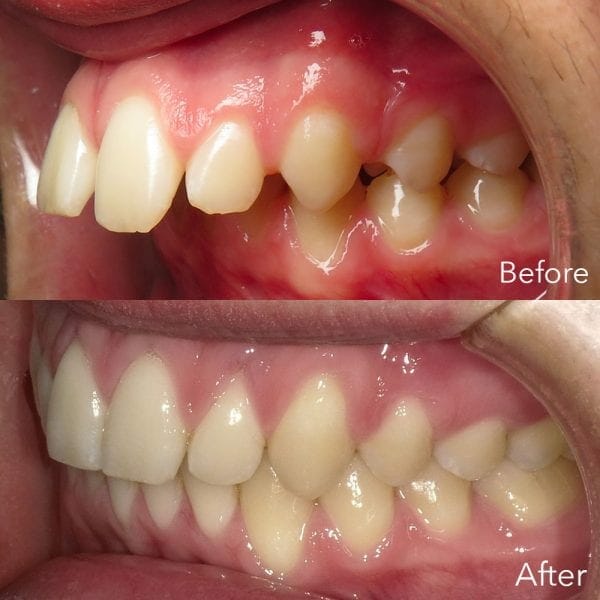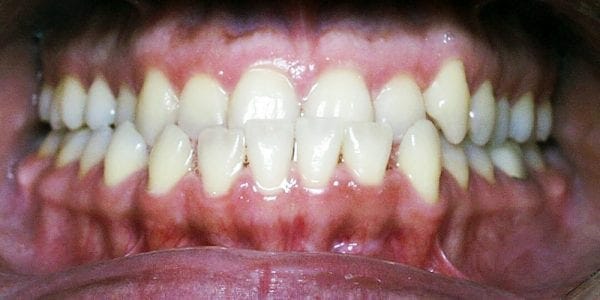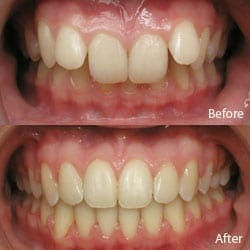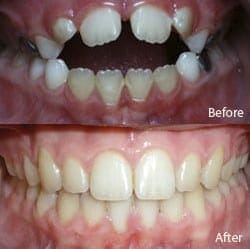Since 1991, Burke & Redford Orthodontists has been providing orthodontic treatment to children, teens, and adults throughout Riverside County. In this two-part article, we’ll look at some of the reasons why patients need orthodontic treatment. Part 1 focuses on bite issues.
Overbites
An overbite is when the top front teeth extend out over the lower front teeth. Also known as excess “overjet,” overbites are the most common type of bite problem. Orthodontists refer to these type of bites as “Class II malocclusions” and they can have skeletal causes (e.g., mismatch in jaw size), dental causes (e.g., teeth are tipped), or a combination of the two.
Overbites are often hereditary. However, they might also be influenced by habits such as thumb sucking or prolonged reliance on pacifiers or bottles.
It not treated, overbites can cause many problems, including:
- difficulty speaking or chewing
- gum damage
- uneven wear of teeth
- poor facial balance
- increased risk of trauma to front teeth
It can be much easier to treat an overbite in younger patients because their jaw is still developing. For children and teens, treatment may take the form of braces, Invisalign, retainers, growth modification devices, or the removal of select teeth. If an overbite the result of a habit such as thumb sucking, the orthodontist may use habit devices to help the patient extinguish the undesirable behavior.

For adults, braces or Invisalign in conjunction with elastics are the most common treatments. However, some overbites require removal of select teeth or (in the extreme case) jaw surgery.
Underbites
An underbite is called a Class III malocclusion by an orthodontist. An underbite happens when the lower jaw extends forward relative to the upper jaw and/or the lower front teeth sit in front of the upper front teeth.

As with overbites, genetics may play a role in whether a patient has an underbite. However, underbites may also be caused by teeth erupting away from their proper position.
Underbites are best treated early on, especially when the issue is caused by a jaw size mismatch. In these cases, the orthodontist may use devices that help to achieve upper and lower jaw balance.
As with other bite issues, underbites can cause numerous problems, including:
- difficulties with chewing
- uneven tooth wear
- speech issues
- poor facial balance
For younger patients whose jaw is still developing, orthodontists have more treatment options at their disposal, including jaw expanders, braces, and Invisalign. Underbite growth patterns are much more unpredictable than overbite growth patterns, which is why early intervention is so critical. For this reason, it is recommended that all children visit an orthodontist by the age of 7.
Deep Bites
A deep bite happens when the upper front teeth come down too far over the bottom front teeth (in the vertical direction) when the jaw is closed. Sometimes, a deep bite is also referred to as an overbite. Although some overlap is normal, if the top teeth overlap the bottom teeth by more than 4 mm, it is considered a deep bite.

Deep bites typically occur when the lower jaw has a certain shape or when the upper teeth are further forward than the lower teeth. A missing lower tooth might also lead to a deep bite. Finally, people who grind or clench their teeth may also have strong biting muscles that can deepen a bite. Genetics also play a factor.
Left untreated, deep bites may lead to:
- sores or ulcers on the roof of the mouth
- excessive wear on the teeth
As with other bite issues, early intervention is critical because it is easier to fix problems when the jaw is still developing. Orthodontic appliances such as braces, retainers, and Invisalign may be used. Sometimes, the size, shape, and position of the teeth may need to be altered.
Open Bites
An open bite happens when the upper and lower teeth don’t touch or overlap properly when biting down. The most common type of open bite is an anterior open bite. This is characterized by a vertical space between the edges of the upper and lower front teeth when biting down. An open bite can make it very difficult to chew with the front teeth. Although more rare, back tooth open bites sometimes occur and are challenging to correct orthodontically.

Open bites can be caused by a variety of factors, including genetics, mismatched jaw sizes, or differences between the size of teeth and the size of the jawbone. However, open bites are also influenced by excessive pacifier use, tongue thrusting, thumb sucking, or prolonged bottle feeding.
Open bites can cause issues such as:
- speech problems (such as a lisp)
- problems biting and chewing food
- excessive wear on the certain teeth
- sensitivity about appearance
Because oral habits play a role in the formation of open bites, early intervention is critical. Orthodontists may recommend a habit appliance to prevent unwanted behaviors, such as thumb sucking. Using behavior modification will also help. Other treatment options include braces, Invisalign, and jaw surgery (surgery is primarily an option for adult patients in extreme cases).
In the second part of this article, we’ll look at other issues that can be treated by an orthodontist, including narrow jaws, teeth crowding, impacted teeth, irregular teeth, the early loss of baby teeth, and oral habits.
Call (951) 699-8011 to Schedule a Free Orthodontic Consultation at our Temecula or Lake Elsinore office with our experienced orthodontists who have been treating children under 7, teens, and adults for over 30 years in the Inland Empire at Burke & Redford Orthodontists. Or you can fill out the form through our website anytime and our staff will return your call to schedule an appointment.